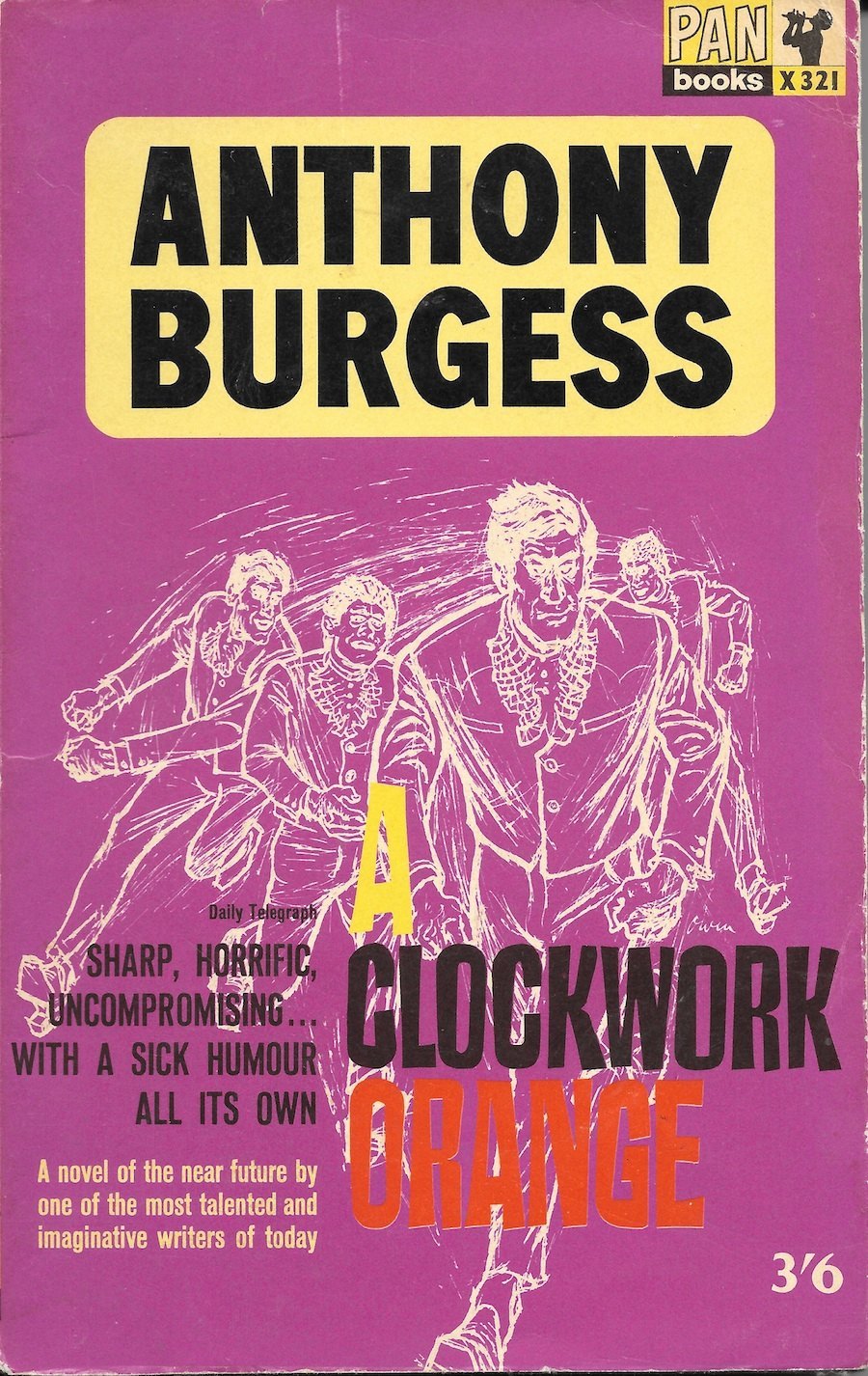Anthony Burgess enjoyed slang so much that in 1965 he accepted a commission to write a dictionary of “low-life language” – “the home-made language of the ruled, not the rulers, the acted upon, the used, the used up. It is demotic poetry emerging in flashes of ironic insight.”
He never finished it. He barely started it. “I’ve done A and B and find that a good deal of A and B is out of date or has to be added to, and I could envisage the future as being totally tied up with such a dictionary,” he wrote.
As slang lexicographer Jonathon Green put it:
‘Burgess sat down and he started doing some letters. What he did no lexicographer, as far I know, has ever done in real life. He thought, “I’ll do A, when I finish A I’ll do B, I’ll do C,” and so on. He got to the end of B and he thought, that’s great I’m doing really well. Someone said have you got “bovver boots,” as worn by skinheads in those days? Big, heavy workman’s boots—Doc Martens. Burgess said, “Oh God, I haven’t got it,” and he gave up.’
Recently, the International Anthony Burgess Foundation discovered the writer’s dictionary notes when cataloguing his papers. Written on hundreds of 6×4 slips of papers, the dictionary was found at the bottom of a large cardboard box, packed underneath some old bedsheets.
In A Mouthful of Air (1992) Burgess writes:
Why the most pleasurable activity known to mankind, and the organs by which it is procured, should be debased through the use of the basic, or quadrilateral, terms as expressions of opprobrium has never been adequately explained. ‘Fucking’, it is true, can be used as a neutral intensifier in ‘fucking good’ and ‘fucking stupid’, but to be ‘fucked’ or participate in a state of ‘fuckup’ is to be in a state of distress. I once heard an army motor mechanic complain of his recalcitrant engine by crying ‘Fuck it, the fucking fucker’s fucking fucked. There you have the word used as five distinct parts of speech. To be called ‘a prick’ (though never ‘a penis’), ‘a cunt’ or ‘a twat’ is not pleasant. There is perhaps a fundamental puritanism in such usages, a denial of the holiness of sexual pleasure, which, of course, explains the taboo.
In his review of The Bloomsbury Dictionary of Word Origins by John Ayto, published in the Observer on 6 January 1991, Burgess looks at the fluidity of language (via Will Carr):
There are some who believe that a knowledge of etymology is helpful to the user of words. This is not so, unless the user be a poet, for it is one of the characteristics of poetry to let swing freely the verbal bell and let often dissonant harmonies ring out. W.H. Auden remembers, or discovers in the OED, that ‘buxom’ has, in its time, meant more than ‘healthily plump or vigorous’ or, increasingly today, ‘large-breasted’. It comes, probably via ‘compliant’ from Anglo-Saxon bugan, to bend. Why a buxom girl should be a bending or compliant one is a psychological or glandular mystery, but Auden’s buxom Venus certainly bends.
He did as all of us should when handed a dictionary: he looked up the rude words:
We now come to the dirtier words. ‘Fuck’ is not one of the ancient Anglo-Saxon quadrilaterals: it is to be found no earlier than the early sixteenth century, though the personal name, John le Fucker, is recorded from 1278: it seems to have got through the net of taboo. ‘Cunt’ named a street in Oxford about 1230 – Gropecuntlane, later sweetened to Magpie Lane. We cannot grope back further than a putative Germanic kunton, meaning the female genitals. To move from the generative to the excretory, I consider ‘shit’ to have one of the most dignified, indeed poetic, etymologies of them all. The sensation of the splitting of the fundament under the stress of fecal discharge relates the word to the Indo-European root skheid – split, divide, separate – and the Greek derivative ‘schizophrenia’.
Entries in A from Anthony Burgess’s lost dictionary of slang
Abdabs (the screaming) – Fit of nerves, attack of delirium tremens, or other uncontrollable emotional crisis. Perhaps imitative of spasm of the jaw, with short, sharp screams.
Abdicate – In poker, to withdraw from the game, forfeiting all money or chips put in the pot.
Abfab – Obsolescent abbreviation of absolutely fabulous, used by Australian teenagers or ‘bodgies’.
Abortion – Anything ugly, ill-shapen, or generally detestable: ‘You look a right bloody abortion, dressed like that’; ‘a nasty little abortion of a film’ (Australian in origin).
Abyssinia – I’ll be seeing you. A valediction that started during the Italo-Abyssinian war. Obsolete, but so Joyceanly satisfying that it is sometimes hard to resist.
Accidental(ly) on purpose – Deliberately, but with the appearance of accident: ‘So I put me hand on her knee, see, sort of accidental on purpose.’ (Literary locus classicus: Elmer Rice’s The Adding Machine, 1923.)
Arse – I need not define. The taboo is gradually being broken so that plays on the stage and on radio and television introduce the term with no protest. The American Random House Dictionary … is still shy of it, however, though not of the American colloquialism ass. Arse is a noble word; ass is a vulgarism.
NOTE: Burgess’s A Clockwork Orange is cited three times in the historical Oxford English Dictionary: ‘thou’, ‘your’ and ‘droog’ which was invented by Burgess in the novel and appears on the first page: “There was me, that is Alex, and my three droogs, that is Pete, Georgie, and Dim.”
Via: The Anthony Burgess Foundation
Would you like to support Flashbak?
Please consider making a donation to our site. We don't want to rely on ads to bring you the best of visual culture. You can also support us by signing up to our Mailing List. And you can also follow us on Facebook, Instagram and Twitter. For great art and culture delivered to your door, visit our shop.














